Planning to launch a niche website but don’t know how to do niche keyword research?
Are you a site owner seeking new juicy niche keywords with business potential?
In any way, I’ve created this in-depth guide to share my tried-and-true process of conducting keyword research for niche sites.
As an SEO specialist, I’ve helped B2B and SaaS companies grow their online presence by researching niche keywords with low competition and business potential.
Let me show you one successful example of keyword niche research and writing.
My well-researched article with on-page optimization resulted in a phenomenal performance in organic search for a SaaS company. One article ranks for over 1.3k target keywords and brings over 3k target visitors to this page about furniture design software.
No link-building or shady SEO practices were used.
This outcome was achieved by smart niche keyword research and SEO writing.
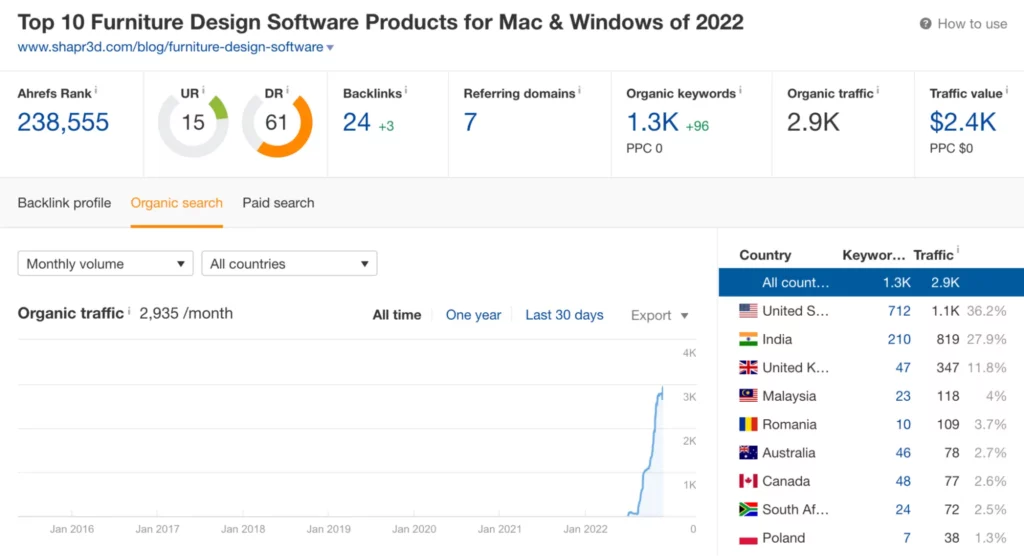


Wondering how to achieve similar and even better results for your niche site?
I am here to help you with niche website keyword research and share the best keyword research tools suitable for beginners and advanced professionals.
Let me start this article with a brief definition of a niche and essentials worth keeping in mind when running a niche site.
What is a niche?
A niche is a segment of a larger market with its own needs, challenges, and likes that differentiate it from the rest of the market.
Let me give you a few examples.
A jewelry shop selling engagement rings exclusively in New York serves a niche market — men preparing to propose.
An online shop that sells healthy snacks in the USA serves a niche market — individuals concerned about their eating habits.
In reality, every business tries to niche down because it’s the only way to survive and prosper in the competitive market.
It’s much easier for established companies to advertise and sell their products to a massive audience because they have the means and reputation.
Startups rarely outperform giants in the same race.
That’s why entrepreneurs carefully research people’s challenges to identify “spaces” that can be fulfilled with a new product or a service.
Let me share my story of how I discovered my niche and what it helped me achieve.
Back in 2020, I was a full-time marketer at a UX agency. I enjoyed my work and was proud to see the client’s website grow.
However, I wanted to have more freedom in life. I wanted to work on projects aligned with my values and be location-independent.
It’s not much to ask.
But every dream requires hard work to achieve.
A few years later, I am an SEO writer, a top writer on Medium, and a solopreneur selling my own ebooks.
Through writing 200+ unsolicited pieces, I realized that people struggle with SEO despite having so many resources available.
Most SEO gurus say what you should do but don’t show what you can achieve.
Popular optimization strategies don’t bring the expected results.
Too much contradictive information is confusing.
People are willing to learn SEO but don’t know who to trust. That’s what I learned from my most popular articles on Medium.
Here is how my niche changed over time until I found a perfect fit that I managed to serve well and monetize.
1) Online marketing -> 2) SEO -> 3) SEO writing
I no longer offer online marketing services because that’s bullshit in most cases. This term is too broad and says nothing about how I can help my target audience.
I also got rid of saying, “I do SEO,” because it’s still too broad. There are many directions in SEO, and I don’t believe anyone can be an expert in all of them simultaneously unless you are Brian Dean or Neil Patel.
SEO is not rocket science, but it requires some practical experience to do things right.
After analyzing the struggles and needs of my readers, I narrowed my niche down to SEO writing.
This way, I serve a specific segment of people with one challenge — “how to create content that ranks high in Google search results?”
Here is what I learned about operating in a niche market that might be helpful to you:
- It’s risky to define a niche on your own. A niche should be validated through your potential audience.
- A narrow niche does not mean fewer opportunities.
- A narrow niche means bringing even higher value to your target audience and earning more.
- A narrow niche helps create a personal brand or a corresponding reputation to a brand.
- Scaling from the bottom is much easier than competing with a big fish.
Once you define and validate your niche, it will be much easier to find niche keywords and conduct niche keyword research.
Let me show you how I do niche blog keyword research for my website that helped me grow Self Made Millennials from 0 to 4,000+ visitors in one year.
How to research keywords for a niche?
Finding keywords for a niche is a monotonous but essential task for every website owner.
As an SEO specialist, I truly understand the value of researching niche keywords with high business potential. Therefore, I never start writing without research.
However, as a human, I want to finish writing quickly and publish a new piece as soon as possible.
Based on my experience, many companies work similarly. They plan content creation one month ahead, don’t take niche keyword research seriously, and wonder why their content does not perform the way it should.
Funny to say, but I’ve done it for my website, too, knowing it won’t bring the desired results.
Goals and deadlines are a kind of pressure that can cloud your mind.
I use my proven-to-work niche keyword research process to avoid distractions that cost me money and time. The main goal of it is to create a 12-month content writing plan for your website that you will follow.
Here is the process of creating a content writing plan, step-by-step.
1. Study your niche
Whether you are starting your business or have been running your niche website for a while, it’s essential to know what your audience is struggling with and talking about online.
You might already know your target audience well, but I encourage you to conduct quick research.
Here is what you can do:
- Check relevant topics on Quora and see what people ask there.
- See what people discuss and post on Reddit.
- Depending on your niche, see what your target audience writes on social media.
- See the most popular Medium articles related to your niche.
This quick research will help you generate some keyword ideas for future analysis.
I encourage you to collect all keywords in one place, such as an Excel sheet.
Here is how I store all keyword ideas I’ve collected about Medium writing:
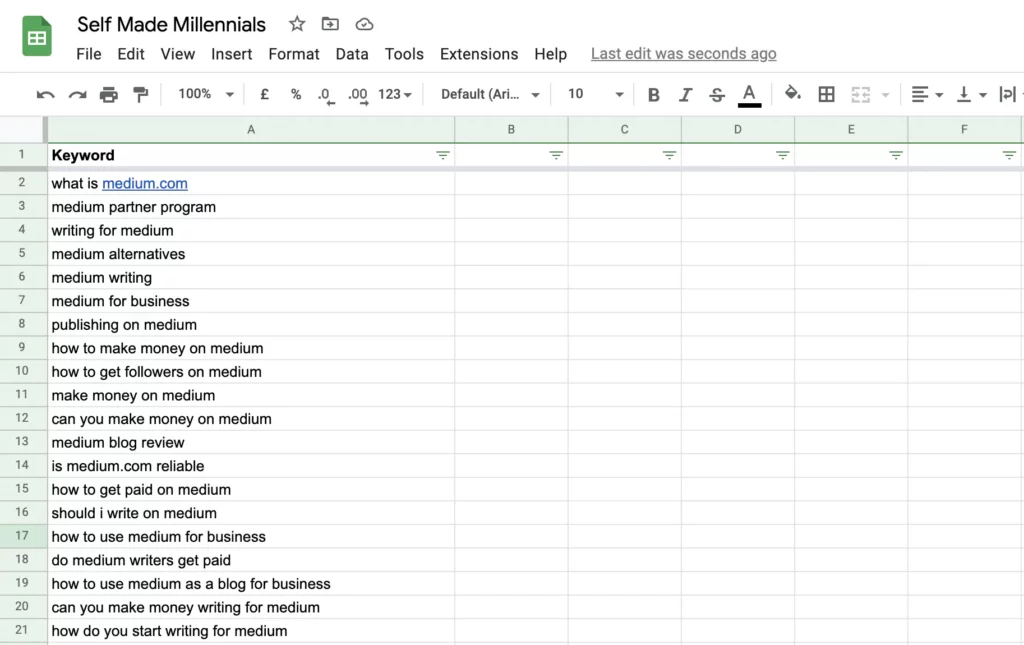


2. Check what your competitors rank for
Regardless of the niche you pick, you’ll always have competitors. Those companies aim to do business with your target audience and steal your piece of the pie.
A competitor site is a gold mine for research and analysis.
Here is how you can use Ahrefs to find niche keywords your competitors rank for but you don’t:
- Paste your website’s URL in the Site Explorer and hit “Search”
- Navigate to “Content gap” in the left sidebar menu
- Paste competitors’ URLs and hit “Show keywords.”
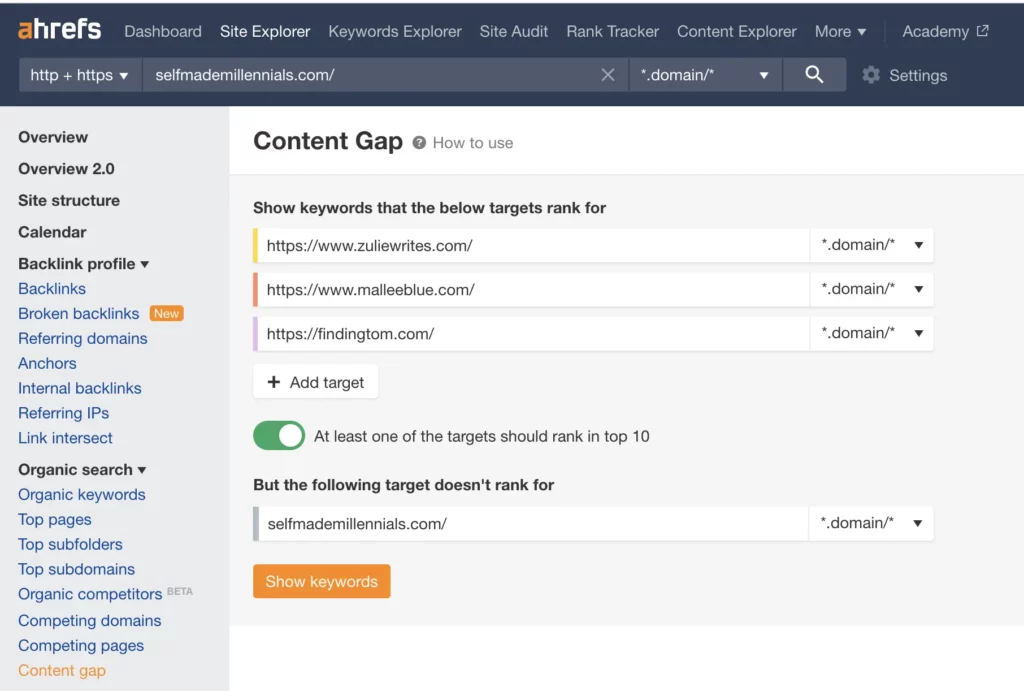


It is a quick and easy hack to find new keyword ideas for your site. You can also do it with Semrush if you prefer it over Ahrefs.
Moreover, you can also see competitors’ top pages by traffic and their best-performing keywords. It’s a very helpful technique.
The screenshot below shows that one of my competitors gets 92.7% of all its website traffic to a single page. It tells me it is worth reviewing this keyword and (maybe) creating an optimized article to rank for it.
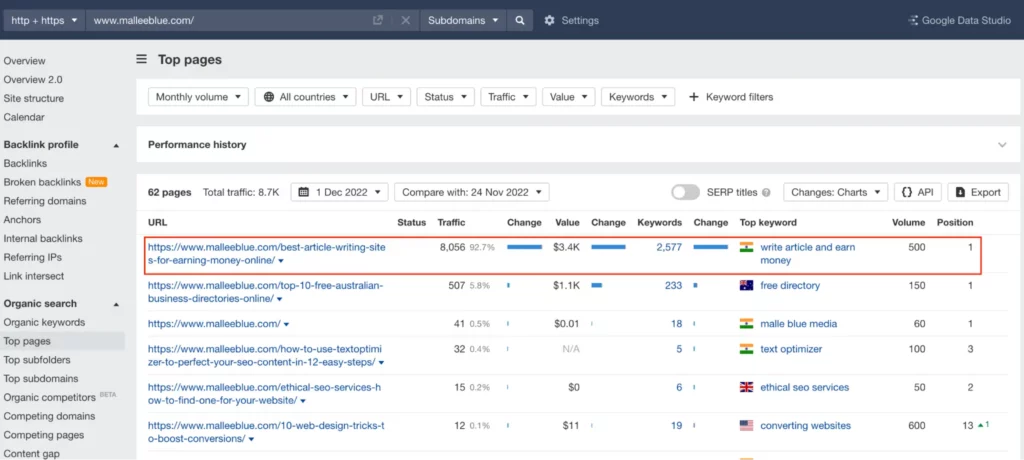


As an SEO specialist, I know that the keyword ideas collection step might take way more time than expected.
The strategies I showed above are usually enough to collect a bunch of keywords for further analysis.
So, once you are ready, move to the next step.
3. Niche keywords analysis
Once you have a list of keywords, it’s worth analyzing which ones have search traffic potential.
Here is my proven-to-work method for analyzing niche keywords.
There are three essential metrics to consider:
Traffic potential: shows how much traffic you can attract to your website if your content ranks in the 1st position for your target keyword.
Global volume: shows how many times people search for your keyword on average per month globally.
Volume in your target country: shows how often people search for your keyword on average per month in your target country.
Keyword difficulty: shows how difficult it will be to rank in the top 10 for your target keyword on a scale from 0 to 100.
You can use various tools to check these metrics. I use Ahrefs in the example below.



The metrics you see on the screenshot are crucial for keyword research niche analysis.
However, the numbers won’t tell you anything unless you know what to look at.
Let me show you how to analyze niche keywords using a “Medium writing” keyword as an example.
Ahrefs shows that over 2.4k people worldwide search for this particular phrase every month. It is impressive, considering the traffic potential is 2k for the first position.
So, we ticked the first two boxes — the traffic potential and global volume are high enough to continue analyzing this keyword.
I would stop looking further if Ahrefs showed 100 or less global volume and close to 0 traffic potential. Such a keyword does not have enough potential for content creation.
As a next step, I analyze the volume in the target country and the keyword difficulty.
Ahrefs shows that mainly people from the US, UK, and Canada search for this particular keyword.
It is an essential piece of information that helps you understand the following:
- Whether people in your target locations search for this particular keyword.
- Whether people come from wealthy countries.
Since Medium is a US open writing platform, it’s not surprising that most traffic comes from this country.
If I wanted to write an article about Medium (which I did), I’d pick this keyword for content writing.
The last but not least important step is analyzing the keyword difficulty.
Various tools measure the keyword difficulty score differently. Ahrefs, for example, defines the keyword difficulty on a scale from 0 to 100, which depends on the backlink profile of the top-ranking websites.
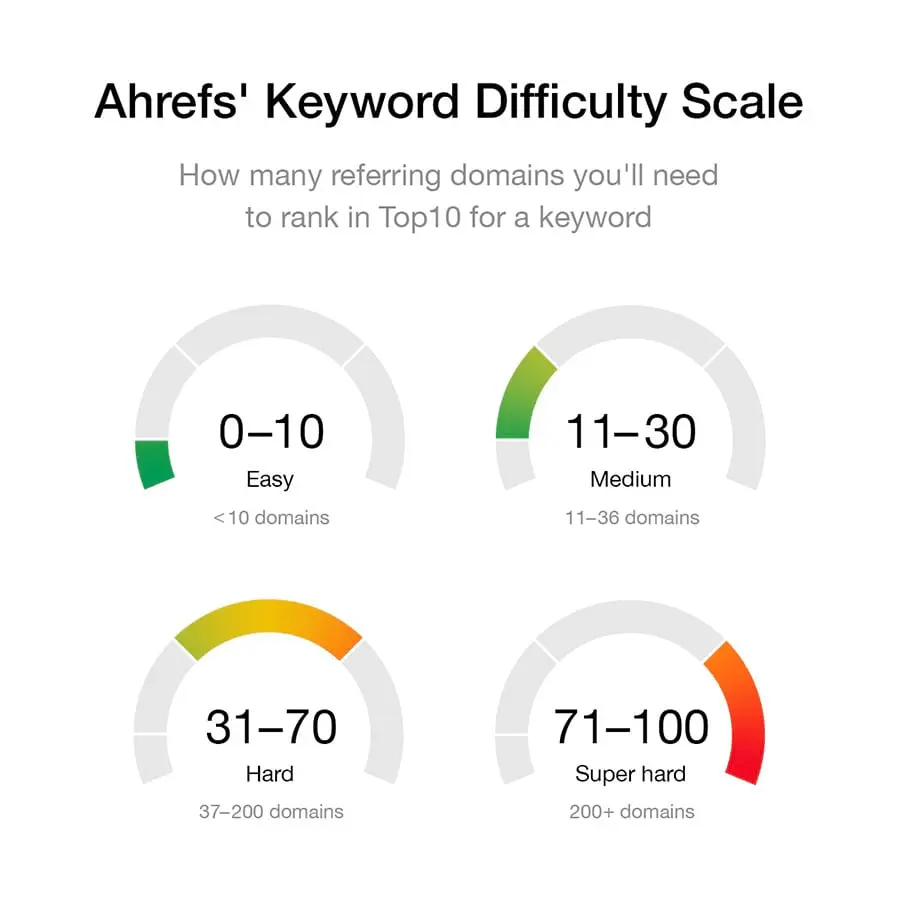


According to Ahrefs, the easiest keywords to rank for have <30 keyword difficulty.
If your website is new or has a low domain rating, you should prioritize keywords with low keyword difficulty. Your website is likely to rank in the top 10 for such keywords if you create well-researched and optimized content.
In my case, the “Medium writing” keyword has a KD 20. It is a medium-difficulty keyword, which means I need to acquire roughly 20 backlinks to push my web page to the top 10 search results.
As an SEO writer, I know that a high-quality, lengthy article written in line with search intent has the potential to rank high even without backlinks. You can learn more about it from my SEO success story.
I’ve given so much information that might sound confusing, especially for newbies. Well, SEO is not an exact science. The most popular answer to all SEO questions is “it depends” because no one can predict how the industry will evolve.
Therefore, feel free to use the following numbers as a benchmark when looking for easy-to-rank keywords with high traffic potential:
- Global volume: 100+
- Volume in your target country: 100+
- Traffic potential: 100+
- Keyword difficult: <30
These metrics will help you pick the easiest keywords to rank for. However, the niche keyword research does not end here. There is one more vital step to consider before creating a content plan.
4. Keyword prioritization based on business potential
When you are done with niche market keyword research, you have many ideas on what to write about.
What should you start with?
Picking the keywords with the highest search volume is not always the best strategy. Your goal is to attract potential customers rather than random traffic.
As Tim Soulo, Ahrefs CMO, once well said:
The primary goal of growing a blog is acquiring new customers. Treat your blog as a customer acquisition channel, not a traffic acquisition channel.
Tim Soulo Ahrefs CMOHow to prioritize keywords to get the highest output from writing?
Focus on keywords with business potential.
If you answer “yes” while analyzing your keywords, assign 3 as business potential. The other less important keywords will get 0, 1, and 2.
- Can this keyword bring me potential customers?
- Do I have products and services I can offer to users who will come to my site through this keyword?
- Can my products solve the needs of the audience that will come to my site through this keyword?
These questions are designed to help you critically assess your niche keywords and prioritize the ones that will help you make money from your website as soon as possible.
You can assign priorities to your keywords in the same excel spreadsheet.
Here is how I’ve done it:
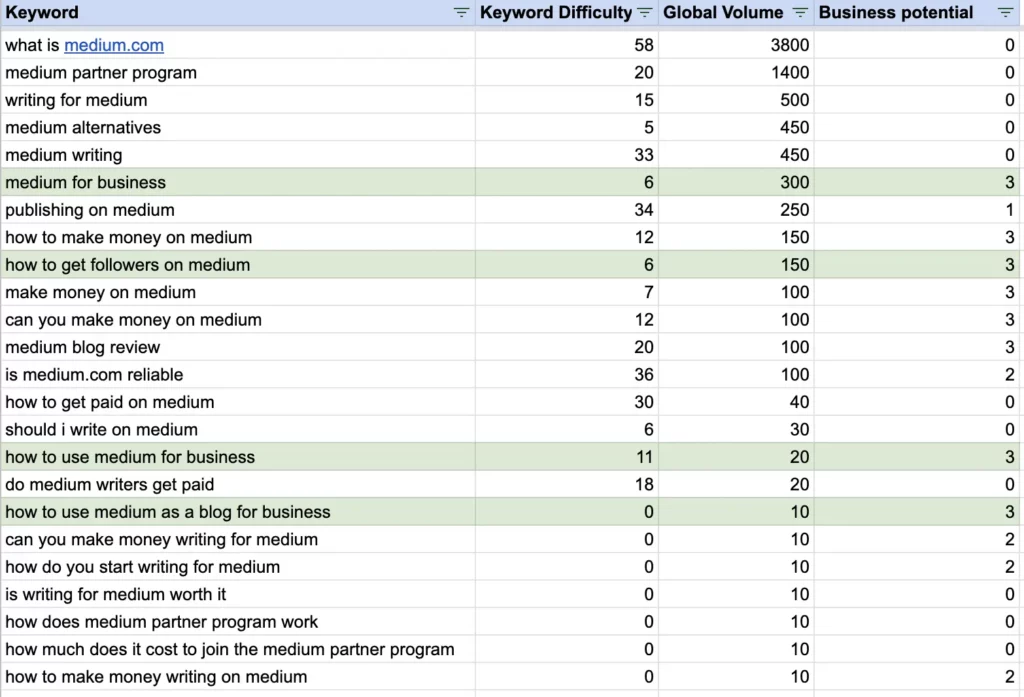


I’ve researched many Medium-related keywords. However, the prioritization technique helped me handpick keywords related to Medium for business.
I recommend doing keyword prioritization before creating a content plan and writing optimized content.
Got some juicy keywords to focus on?
Let me show you how you can create a content writing plan that you can use for your website.
5. Content writing plan
A content writing plan is a schedule of what you should publish on your website and when.
It helps you avoid guessing and allocating resources to content that won’t yield desired results.
Having a content writing plan helps you save time and plan your resources in advance.
As a website owner and an SEO writer, I usually prepare a content writing plan in advance for at least 6 months.
Here is what I wanted to achieve while creating a content plan for the last two quarters of 2022:
- Attract users interested in SEO writing, so I can (1) grow my SEO writing email list and (2) sell my digital products and consulting.
- Increase affiliate sales through tool reviews.
Let me show you how a content writing plan looks using my niche website example.
The screenshot below is an excerpt from my content writing plan you can see here:
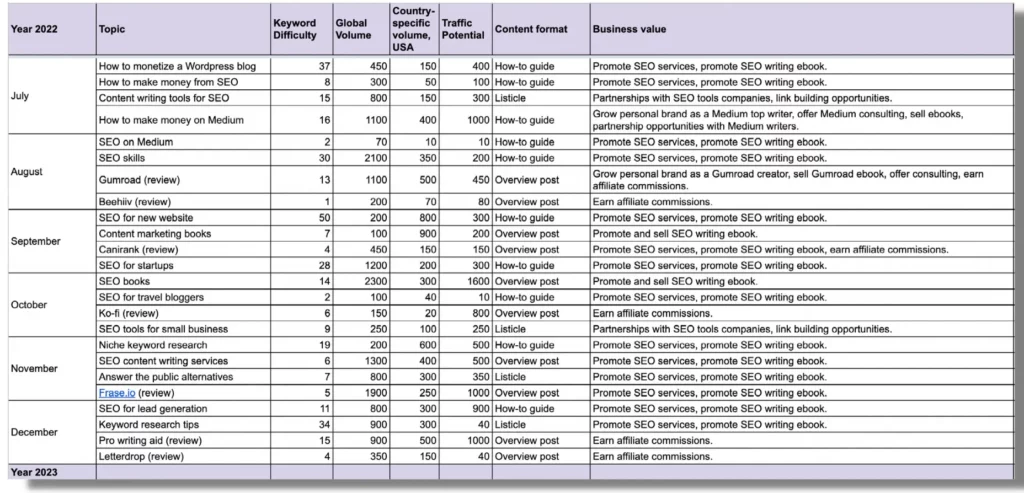


Besides locating keywords in the order of priority with their metrics, I recommend adding a few more details to the content plan that will make it more informative for you and your team:
- Content format
- Business value
I’ve already discussed the importance of business value earlier in this article.
Every keyword you pick for writing should help you get closer to achieving your business goals, whether it is lead generation, sales, or conversion rate increase.
Traffic acquisition should not be your primary goal in content writing.
Content format, on the other hand, will help you grasp how your content should be structured.
Should it be a listicle, a guide, a checklist, or a selling landing page.
Knowing a suitable content format for your particular keyword will help you create a content piece that’s in line with search intent and has the highest chance of ranking in the top 10 search results.
How to know the proper format for your article?
Analyze the content format of the top 10 ranking web pages. Google believes those are the most relevant search queries to your keyword.
Let’s say I want to write an article about Medium opportunities for business. This article can be formatted differently, but I want to make sure my article has the most suitable format for users and Google.
So, google this keyword and check what’s ranking on top:
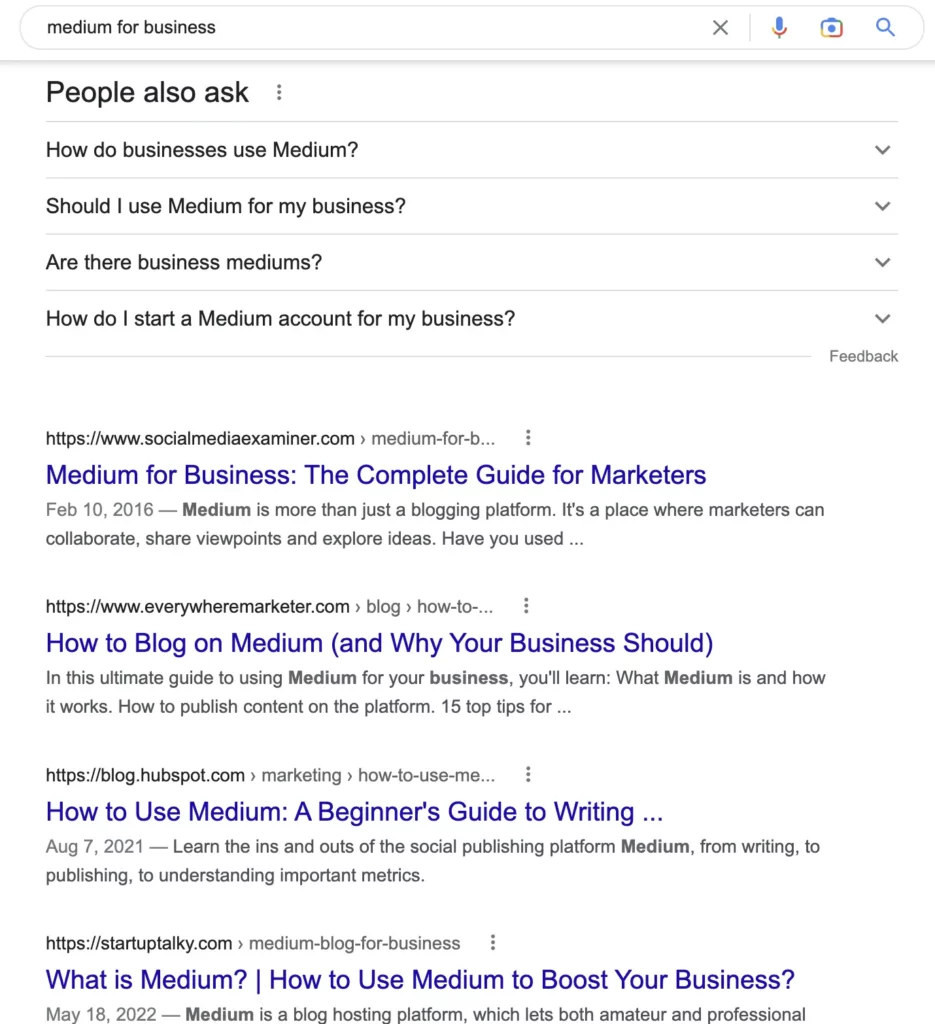


The screenshot shows you the 4-7th search results, omitting Medium-owned content shown on the first three positions.
This quick research tells me that the majority of pages are how-to guides. Perhaps, I should format my content in a similar way to increase my chances for high rankings.
Another essential thing to highlight here is to make your content stand out!
There are so many identical articles on the web that readers are tired of wasting their time on shallow content.
You can spy on competitors, but don’t copy-paste their ideas without adding additional value.
Whenever you write a new piece, add a unique angle to it, make the title catchy, and add your own opinion and expertise to the content.
This will help you create high-quality content worth reading.
Two niche keyword research tools
As an SEO writing specialist, I frequently hear the following questions from my readers and clients:
- How to find low-competition niches?
- How to use Google trends to find a niche?
- How to find niche keywords?
- How to find related keywords?
If you are interested in low-competition niches, I’ve researched some blogging niche ideas that you may find interesting.
As to niche keyword research, I rely on proven-to-work tools to discover and analyze keywords.
The following are my favorite paid and free niche keyword research tools.
Ahrefs
There are a few universal marketing tools, and Ahrefs is one of them.
Besides keyword research for niche sites, it can help you analyze your current website performance, do a quick technical audit of your site, define and analyze competitors, and more!
Ahrefs is an expensive tool. You’ll have to pay at least $99 per month.
However, the Ahrefs team has also made some tools available for free with limited functionality.
For example, you can check the keyword difficulty and the volume in a target country using Ahrefs’ free Keyword Generator.
The tool analyzed my target niche keyword and offered related keywords and questions.
This is very valuable information for on-page optimization.
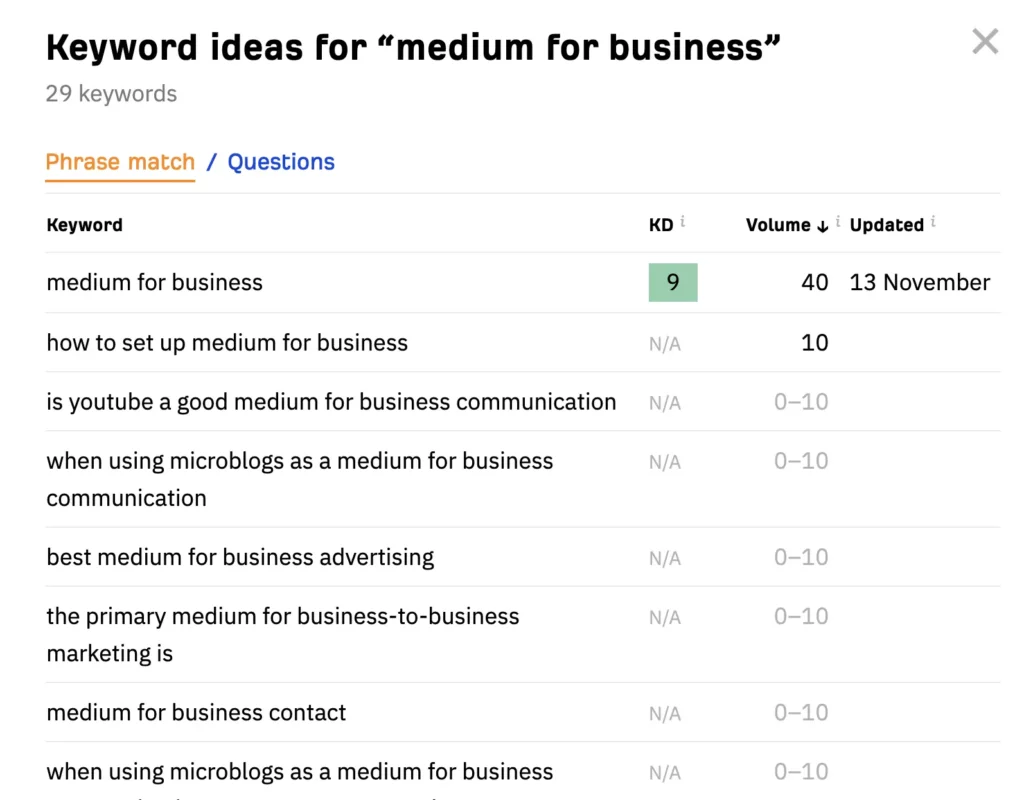


Semrush
Semrush is an alternative to Ahrefs, which is as powerful.
Unlike Ahrefs, Semrush has dedicated tools for content marketing, social media, advertising, trends analysis, lead generation, and more.
Semrush has an extensive toolkit for SEO, including on-page optimization.
Even though it is a paid tool, you can do a limited number of daily searches for free.
Check how much valuable data I’ve got by analyzing my keyword with the Semrush free account.
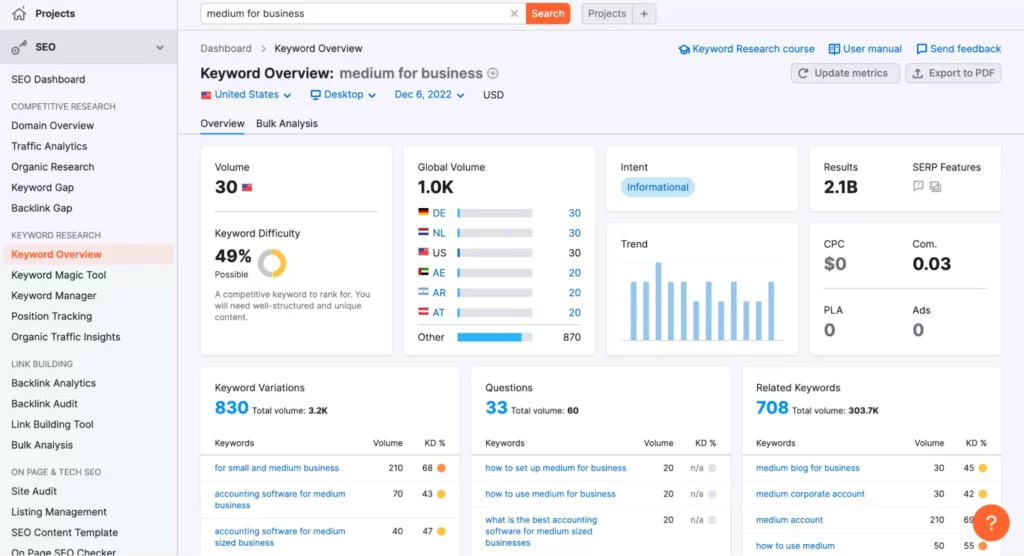


Like Ahrefs, Semrush can show you the keyword volume globally and in a particular country, the keyword difficulty, and related keywords to target.
It also shows you the search intent (informational in my particular case), which helps you plan your content format accordingly.
Ahrefs and Semrush are the best niche keyword research tools. However, if you are looking for affordable options to start with, I’d recommend checking the following tools:
I hope this article was helpful to you and you have a clear picture of how to conduct niche keyword research for your website.
Want to learn more about SEO and how to create content that hits the Google front page? Subscribe to my weekly newsletter.
Need help with keyword research?
I help B2b and SaaS companies, startups and content creators grow their websites in organic search results. Learn more about my SEO keyword research services.



Hello there!
My name is Victoria.
I am an SEO expert, Medium top writer, solopreneur, and the founder of Self Made Millennials. I help companies create optimized content and attract potential customers through organic search results. In addition, I share how content creators can monetize their writing skills.
Download my case study
Latest posts
Get my SEO writing guide
Related blog posts
SEO writing A Guide to SEO for Lead Generation In 2024 written by Victoria Kurichenkoposted on February 23, 2023As an SEO writing expert, I often hear the following complaints from my current clients and prospects:We want to use SEO for lead generation but do not know how.We struggle to implement …
SEO writing SEO For a New Website In 2023 written by Victoria Kurichenko updated on October 16, 2022 A well-performing website is often perceived as a lucrative but challenging endeavor. It seems everything has already been said and written online, and there is no way to get noticed in all …



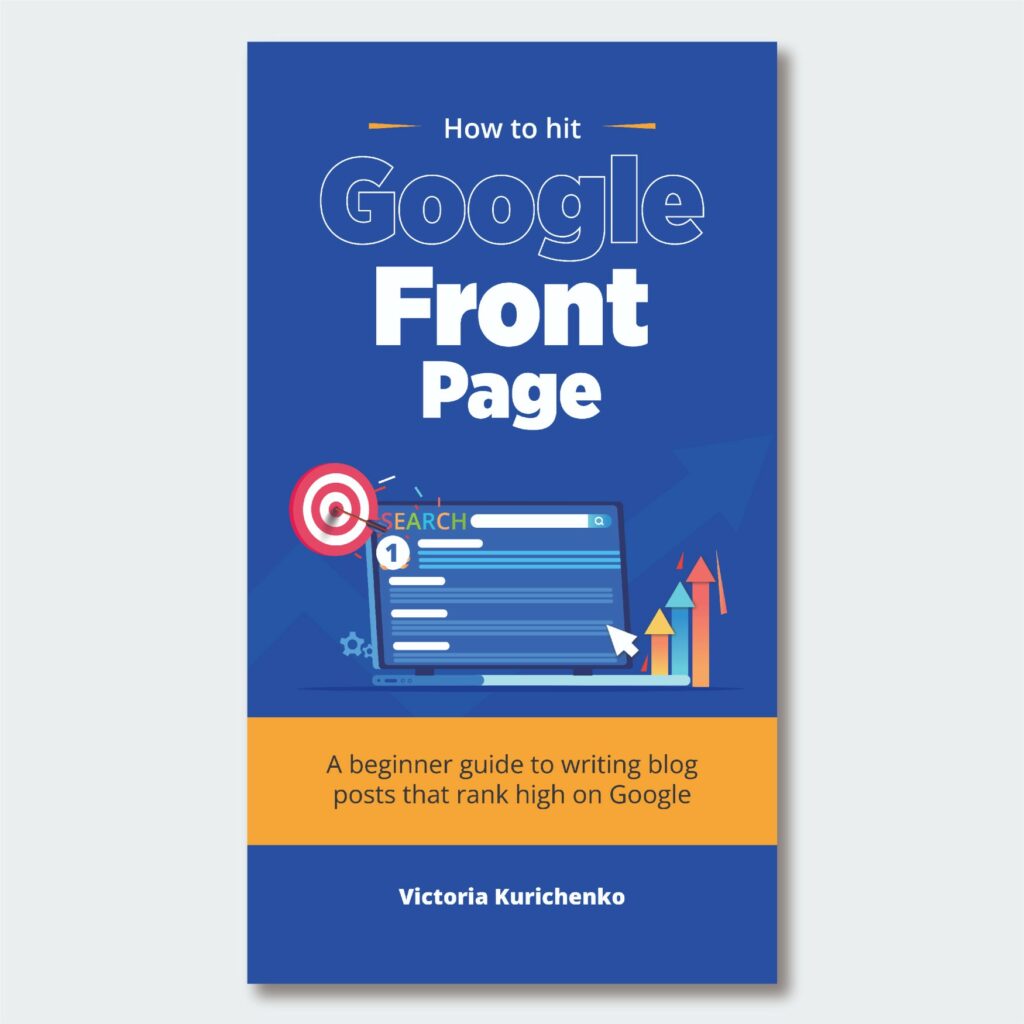


3 Responses
I wanted to learn how to write a good SEO article for a website in 2023. I’m just starting to create texts for my blog, but I’ve never done anything like this before. Your advice helped me a lot. Although, probably, my first article will not be very good))))))
Hello there! Do you use Twitter? I’d like to follow you if that would be ok. I’m undoubtedly enjoying your blog and look forward to new updates.
Sure! Here is my twitter account – https://twitter.com/k36_victoria